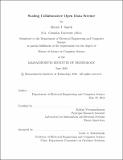Scaling collaborative open data science
Author(s)
Smith, Micah J. (Micah Jacob)
DownloadFull printable version (3.388Mb)
Other Contributors
Massachusetts Institute of Technology. Department of Electrical Engineering and Computer Science.
Advisor
Kalyan Veeramachaneni.
Terms of use
Metadata
Show full item recordAbstract
Large-scale, collaborative, open data science projects have the potential to address important societal problems using the tools of predictive machine learning. However, no suitable framework exists to develop such projects collaboratively and openly, at scale. In this thesis, I discuss the deficiencies of current approaches and then develop new approaches for this problem through systems, algorithms, and interfaces. A central theme is the restructuring of data science projects into scalable, fundamental units of contribution. I focus on feature engineering, structuring contributions as the creation of independent units of feature function source code. This then facilitates the integration of many submissions by diverse collaborators into a single, unified, machine learning model, where contributions can be rigorously validated and verified to ensure reproducibility and trustworthiness. I validate this concept by designing and implementing a cloud-based collaborative feature engineering platform, Feature- Hub, as well as an associated discussion platform for real-time collaboration. The platform is validated through an extensive user study and modeling performance is benchmarked against data science competition results. In the process, I also collect and analyze a novel data set on the feature engineering source code submitted by crowd data scientist workers of varying backgrounds around the world. Within this context, I discuss paths forward for collaborative data science.
Description
Thesis: S.M. in Computer Science, Massachusetts Institute of Technology, Department of Electrical Engineering and Computer Science, 2018. This electronic version was submitted by the student author. The certified thesis is available in the Institute Archives and Special Collections. Cataloged from student-submitted PDF version of thesis. Includes bibliographical references (pages 103-107).
Date issued
2018Department
Massachusetts Institute of Technology. Department of Electrical Engineering and Computer SciencePublisher
Massachusetts Institute of Technology
Keywords
Electrical Engineering and Computer Science.